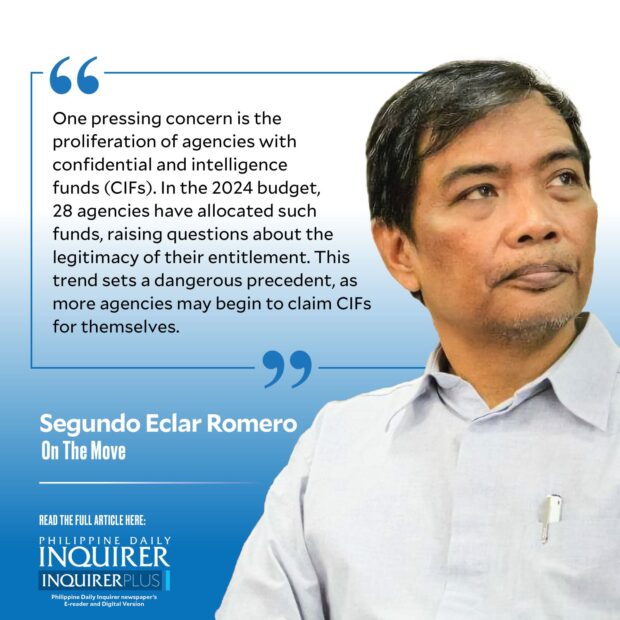
One pressing concern is the proliferation of agencies with CIFs. In the 2024 budget, 28 agencies have allocated such funds, raising questions about the legitimacy of their entitlement. This trend sets a dangerous precedent, as more agencies may begin to claim CIFs for themselves.
CIFs are meant for “surveillance activities in civilian government agencies supporting their mandate or operations.” However, the lack of clarity on their purpose can lead to misuse. Establishing clear categories and processes for designing, implementing, and evaluating CIF usage is essential.
Some agencies have reclassified intelligence funds as confidential funds to avoid stricter accountability requirements. These reclassifications warrant proper vetting to ensure transparency and adherence to regulations.
Imbalances in fund allocation are another concern. Some civilian agencies receive substantial CIF increases, while agencies dealing with critical national security challenges receive disproportionately less. A robust system is needed to ensure that CIFs prioritize crucial security objectives.
The secretive nature of CIF usage poses auditing challenges. Relying on certifications from government agencies and the absence of receipts for many expenses hinder transparency. Developing a fit-for-purpose auditing system can enhance transparency.
Although agencies are required to submit quarterly reports on CIF usage, it is unclear whether these reports are consistently provided. Congressional oversight should play a significant role in ensuring that CIF utilization enhances national security.
The tradition of parliamentary courtesy can allow certain offices, such as the Office of the Vice President, to evade scrutiny in CIF use. Preventing premature closure of hearings is essential for accountability.
Allocating substantial CIF amounts to certain offices, especially when they exceed norms, raises concerns about financial transparency.
Reports of certain offices receiving CIFs in 2022 without a corresponding line item in the General Appropriations Act (GAA) raise legal concerns regarding fund allocation.
To develop effective systems for overseeing and ensuring accountability in CIF usage, we can draw inspiration from countries that have successfully implemented such systems.
United Kingdom’s Intelligence and Security Committee (ISC): (1) Independent oversight: The ISC is an independent parliamentary committee tasked with overseeing the UK’s intelligence and security agencies, including CIF allocation and utilization. (2) Comprehensive reporting: The ISC produces annual reports that offer in-depth insights into intelligence agency activities and expenditures, enhancing transparency. (3) Access to classified information: Committee members are granted security clearances, allowing them to access classified information relevant to CIFs and intelligence operations. (4) In-depth investigations: The ISC can initiate investigations into various aspects of intelligence agency operations, including financial matters, promoting accountability. (5) Cross-party membership: Comprising members from different political parties.
Canada’s Security Intelligence Review Committee (SIRC): (1) Independent oversight: SIRC is an independent agency responsible for reviewing the operations of the Canadian Security Intelligence Service (CSIS). (2) Annual reports: SIRC submits to the parliament and publishes annual reports that assess CSIS activities and expenditures, including financial practices. (3) Access to classified information: SIRC members possess security clearances, allowing them access to sensitive information relevant to CIF utilization. (4) Investigative powers: SIRC has the authority to investigate various aspects of CSIS operations, including financial matters, ensuring accountability. (5) Engagement with civil society: SIRC actively engages with civil society organizations and stakeholders to gather input on CSIS activities, including financial transparency. (6) Transparent reporting: SIRC’s reports are publicly available, offering insights into CSIS financial practices and CIF usage, and promoting public awareness and accountability.
In both the UK and Canada, systemic improvements are key to combating corruption and ensuring the responsible use of CIFs. If we do not purposively develop similar systems, CIFs will continue to distort our governance and handicap our efforts to provide inclusive security and development to our people.
doyromero@gmail.com